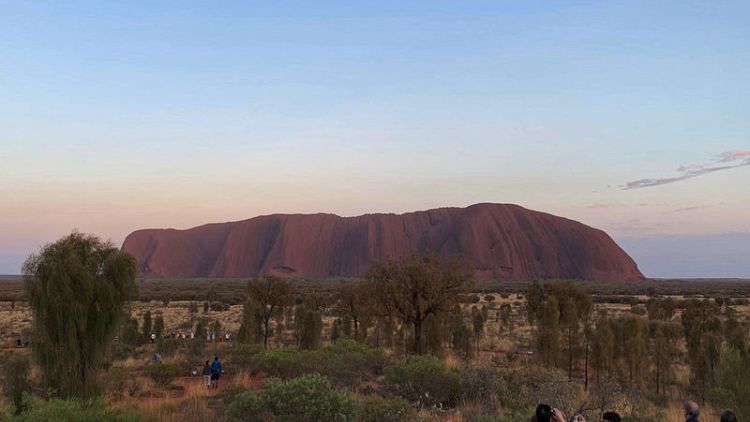By Stefica Nicol Bikes
YULARA, Australia (Reuters) - Hundreds of tourists formed long queues to climb Australia's Uluru soon after dawn on Friday, the day before a permanent ban on the climb takes effect following a decades-long fight by indigenous people to close the trek.
Blustery conditions meant visitors were stopped from making an early morning climb and authorities said they will reassess during the day whether or not to reopen.
The UNESCO World Heritage-listed 348-metre (1,142-ft) monolith, formerly known as Ayers Rock, is a top tourist draw in Australia despite its remote desert location near Alice Springs in the Northern Territory.
While most visitors do not climb Uluru's steep, red-ochre flanks, the impending Oct. 26 ban has triggered an upsurge in people taking advantage of a final opportunity to make the trek.
The Anangu people, the traditional owners of Uluru, have called for the climb to be closed since 1985, when the park was returned to indigenous control. The Anangu say Uluru has deep spiritual significance as a route their ancestors took.
Kelly Derks, from the Australian city of Melbourne, said she wanted to climb Uluru while at the same time respect indigenous beliefs.
"We respect that, we climb but we don't leave rubbish, we stay to the path," said Derks.
Dozens of people have died while climbing Uluru, from falls and dehydration.
Sonita Vinecombe, from the Australian city of Adelaide, said the impending ban prompted her to come to Uluru.
"We weren't planning to come anytime soon, but because it's the last day we are here," she said.
Nearly 400,000 visitors flocked to the Australian landmark in the year to end-June, government data shows.
The closure was announced two years ago when fewer than 20 percent of visitors were making the climb.
To commemorate the climbing ban the park will conduct public celebrations over the weekend.
"It is an extremely important place, not a playground or theme park like Disneyland," Anangu senior traditional owner Sammy Wilson said in a statement.
"We welcome tourists here. Closing the climb is not something to feel upset about, but a cause for celebration."
(Reporting by Stefica Nicol Bikes in Yulara; writing by Swati Pandey and Jonathan Barrett; Editing by Lincoln Feast)
